Genre: RPG Developer: WaterMelon Corp. Publisher: WaterMelon Corp. Players: 1 Released: 2010
When Pier Solar was first conceived back in 2004, few thought that it would ever be completed. Fewer still thought that homebrews on the Genesis were even actually marketable. Surely no one would be willing to pay for a new Genesis game, especially one that would take years to complete and might not even be released. However, when the pre-orders were opened, the initial batch sold out, and several more have done so as well, making Pier Solar the best-selling Genesis post mortem release of all time and perhaps the most successful homebrew of its type ever.
Nintendo guru Shigeru Miyamoto once commented that a late game was late only until it shipped, but a bad game was forever. WaterMelon took this as its mantra and focused all its energy on delivering a product that would live up to the immense hype that had been generated in the retro community. Despite the hiccups in the pre-order and delivery processes, the actual game itself is a wonder to behold in all senses, and it’s amazing that anyone would pour this amount of love into a release that was essentially expected to break even at best.
Beginning with the packaging, with all the collectible goodies contained therein, Pier Solar shines as perhaps the biggest love letter to Genesis fans as has ever been seen. More importantly, the actual game distinguishes itself from the console’s library of RPGs in both length and storytelling, and it even licks a bunch of them in gameplay. Pier Solar weighs in at a staggering 64 megs, making it the largest Genesis game ever released, and the cart’s massive size is quickly justified through the lush, detailed graphics, full-screen cut scenes, and enchanting soundtrack. This was no mere homebrew project slapped together in a few weeks. What WaterMelon has produced is an international effort to make a game for the ages, one that would stand out foremost in gamers’ minds when they recalled the great RPGs on the Genesis. It’s also a great feather in the cap of Genesis fanboys everywhere!
Pier Solar’s narrative about a small town boy named Hoston being inadvertently thrust into a heroic situation seemingly over his head is the bread and butter of the genre, but the game moves more naturally within these confines than most. Along the way, Hoston and his friends experience their share of tragedy triumph and adventure, and over the course of their massive adventure, they develop and grow to depend on one another, essentially maturing before players’ eyes, and all in the face of a world crisis. I don’t want to spoil too much of the storyline, but suffice it to say that there is a deep mystery here that will take upwards of twenty-five hours to unravel. During all my playtime, never did the plot seem contrived or derivative, and the slow burn revealing of what exactly the Pier Solar is makes for some great storytelling. It also leaves ample room for a sequel. Furthermore, the dialogue is funny and well-written, and the trio of main characters is easy to identify with, something lacking in far too many RPGs.
WaterMelon was forced to redo all the visuals halfway through development, a problem that delayed the game considerably. Taking a look at the gorgeous screen shots to the left (which look SO much better on a real TV in s-video), it’s obvious that the group was able to overcome this obstacle in spectacular fashion. The variety of environments in Pier Solar are all detailed and colorful, and there’s just so much going on in each town and locale that players will find themselves wandering around just to make sure they’ve seen everything. Moreover, the great presentation is brilliantly rounded out by an impressive soundtrack. The CD score is truly incredible, and even the cartridge FM soundtrack is awesome enough to warrant using. I played about equally with both versions, and either one is more than worthy of using the whole game through.
Presentation is nothing without solid gameplay to back it up, and in this most vital area Pier Solar does not falter. WaterMelon has created a smooth turn-based combat engine that works as well as any professionally-made game, and random battles are evenly spaced out to permit exploration. However, perhaps the most impressive aspect of its gameplay is the Gather feature. During combat, characters can charge, or “gather” their attack energy to use for more powerful spells and skills. Gather can also be obtained through special items like chili or, fittingly enough, watermelons. Equally, the characters can lend their Gather power to each other, and some of the game’s most powerful attacks require an amount that only a group effort can provide. Once properly charged, the attacks can be used for the duration of the battle, providing that there is the minimum number of party members with the required amount of Gather. Using this powerful and innovative gameplay dynamic forces players to think beyond the standard “attack, cure, defend” mentality associated with typical turn-based RPG combat.
This is not to say that defending is ignored completely. Keeping a charged character protected is vital, and some, like Alina and Edessot, can be vulnerable in the early going, especially from poison attacks. Correctly defending, along with wise Gather choices, means that even random battles have a strong element of strategy to them. I can’t speak for everyone else, but for me this is a very fresh and welcome element to old school RPGs.
Though Pier Solar is a stellar first effort, it isn’t perfect, and WaterMelon’s lack of design experience is evident in a few areas. There are several things that might bother seasoned RPG gamers, such as the decision to not include inns in several towns (particularly near the end of the game), the high cost of healing items in stores, characters using healing items despite the fact that their targeted ally was killed earlier in the turn, and the high ambush and poison instances. There has also been an issue with the enhanced soundtrack CD, which saw enough copies skip and freeze for WaterMelon to make the file available for download in its forums. Reportedly, a burned CD-R will work fine, but it’s a bit disappointing that this extra step must be taken. It’s worth it in the end though, given just how good the CD compositions are.
My biggest concern was with the use of healing spells outside of combat. In the spell menu, the cursor can only move between those characters who have magic (for example, Hoston and Alina early on), and only the energy of the first four characters is shown. The fifth one can’t be seen if he or she doesn’t know magic. So, if players aren’t sure if the fifth character needs to be healed, they have to exit the spell menu, open the inventory menu, and then scroll to the end to see. Finally, they have to reopen the spell menu and heal the ailing character. This is more than a bit awkward in that it’s totally different from the inventory option. In that one, players can scroll through each character and see everything, select an item, and use it – all on the same screen. Players can even have one character use an item on another without having to leave the item menu screen; it’s great. In contrast, the spell menu seems like it was done by an entirely different person.
Another problem with this is that characters have to physically be close to Hoston to be healed via magic, which means they can’t be cured with spells if they’re not visible on the screen. To actually heal them, players have to physically select the character with the cursor, which means that if they’re coming up a stair case, in a door, or even obstructed by the foreground, the character who needs to be healed isn’t visible and can’t be chosen. Players actually have to move the party and string them out so that they’re all visible in order to select the right one, and this can lead to many unwanted fights. I can’t begin to mention how many times I’ve been caught in a random battle trying to do this.
Despite my ranting about the healing interface, don’t let these minor gripes influence a decision to play what is definitely one of the best RPGs on the Genesis. None of the afore-mentioned flaws should deter anyone from obtaining Pier Solar. The massive adventure, endearing characters, incredible presentation, and innovative gameplay put it in the upper echelon of Genesis RPGs. If this is WaterMelon’s first effort, I simply cannot wait to see what it comes up with once it hits a stride. Everyone who owns a Genesis and enjoys RPGs must simply play this; it’s that simple. Kudos to WaterMelon for showing everyone that the Genesis still does!
SCORE: 9 out of 10

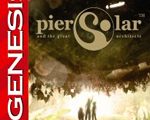
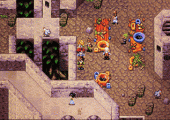
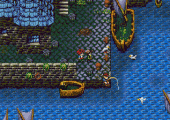
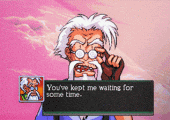
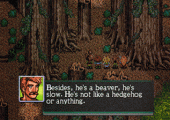
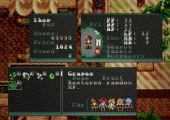
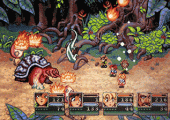
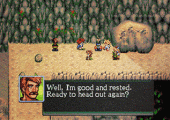

This is a fantastic game by far one of the best 16-bit RPGs ever produced. The story is incredible as the visuals and the music. The gameplay is very intuitive and polished making Pier Solar a joy to play. Everyone with a Genesis/MD should play this!
Pier Solar is an excellent game, maybe the best “homebrew” that I’ve ever seen. It’s beautiful, epic, sounds great, and does a lot of innovative things (for the Genesis). Still, it does have some major shortcomings. It can be incredibly difficult, and there are plenty of moments where it’s not clear what you’re supposed to do. Sure, the pay off of figuring things out yourself is nice, but this game is just begging for a comprehensive walkthrough.
I’d recommend Pier Solar to any Genesis fan.